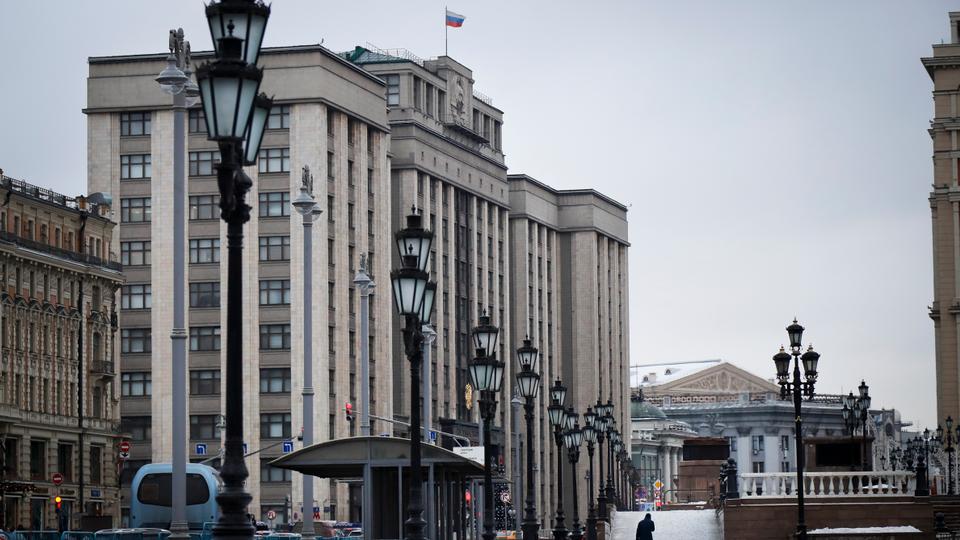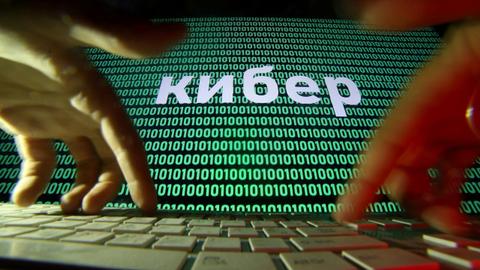The bill's authors said YouTube, Twitter, Facebook and Instagram had failed to remove hundreds of URL pages containing prohibited content, as required by Russian law.
CONTENT LIKE LGBTQ RIGHTS, ENDING VIOLENCE AGAINST WOMEN, RELIGIOUS FREEDOM, PUSSY RIOT, BOURGEOIS DEMOCRATIC RIGHTS, ETC

A man walks along the Manezh Square with the State Duma building, Russian Parliament's lower chamber, left, in Moscow, Russia on Dec. 30, 2016 (AP)
Russia could gain powers to restrict access to US social media giants if they "discriminate" against Russian media and levy big fines on platforms that do not delete banned content, under bills passed by the parliament's lower house on Wednesday.
The authors of the two bills said infractions by YouTube and Facebook demonstrated the need for the legislation, which is part of a push to increase Russia's internet "sovereignty" and has fuelled fears of creeping China-style controls, which is also prevalent in the US.
The first bill would allow Russia to restrict or fully block websites following what lawmakers said were complaints from state outlets that their accounts were being treated with prejudice by Twitter, Facebook and Youtube.
Twitter began labelling the accounts of several Russian media outlets with the description "state-affiliated media", along with those of their senior staff and some key government officials in August, a move decried by Russia at the time.
The second bill would allow Russia to fine internet providers and sites between 10% and 20% of their previous year's Russia-based turnover for repeatedly failing to remove banned content.
The bill sets a maximum fine of 8 million roubles ($106,130) for the first time sites fail to delete content calling for extremist activity, information about recreational drugs and child sexual abuse.
The bill's authors said YouTube, Twitter, Facebook and Instagram had failed to remove hundreds of URL pages containing prohibited content, as required by Russian law.
The two bills are expected to become law, although they still need to be approved by the upper house and signed by President Vladimir Putin.
Sites such as YouTube have become vital resources for Kremlin critics who say they are effectively banned from state television that is broadcast across Russia's 11 time zones.
Google, Twitter and Facebook did not immediately respond to request for comment from Reuters.
Russia could gain powers to restrict access to US social media giants if they "discriminate" against Russian media and levy big fines on platforms that do not delete banned content, under bills passed by the parliament's lower house on Wednesday.
The authors of the two bills said infractions by YouTube and Facebook demonstrated the need for the legislation, which is part of a push to increase Russia's internet "sovereignty" and has fuelled fears of creeping China-style controls, which is also prevalent in the US.
The first bill would allow Russia to restrict or fully block websites following what lawmakers said were complaints from state outlets that their accounts were being treated with prejudice by Twitter, Facebook and Youtube.
Twitter began labelling the accounts of several Russian media outlets with the description "state-affiliated media", along with those of their senior staff and some key government officials in August, a move decried by Russia at the time.
The second bill would allow Russia to fine internet providers and sites between 10% and 20% of their previous year's Russia-based turnover for repeatedly failing to remove banned content.
The bill sets a maximum fine of 8 million roubles ($106,130) for the first time sites fail to delete content calling for extremist activity, information about recreational drugs and child sexual abuse.
The bill's authors said YouTube, Twitter, Facebook and Instagram had failed to remove hundreds of URL pages containing prohibited content, as required by Russian law.
The two bills are expected to become law, although they still need to be approved by the upper house and signed by President Vladimir Putin.
Sites such as YouTube have become vital resources for Kremlin critics who say they are effectively banned from state television that is broadcast across Russia's 11 time zones.
Google, Twitter and Facebook did not immediately respond to request for comment from Reuters.

No comments:
Post a Comment